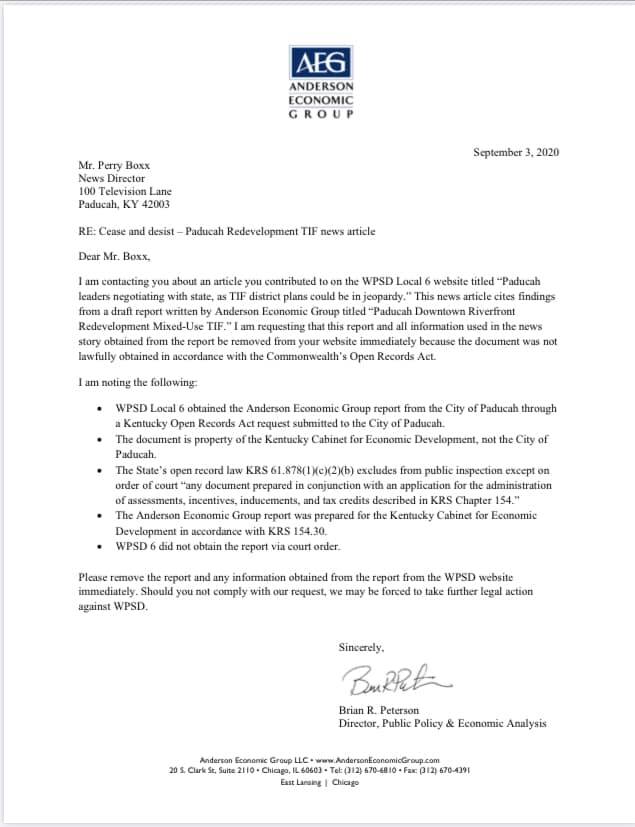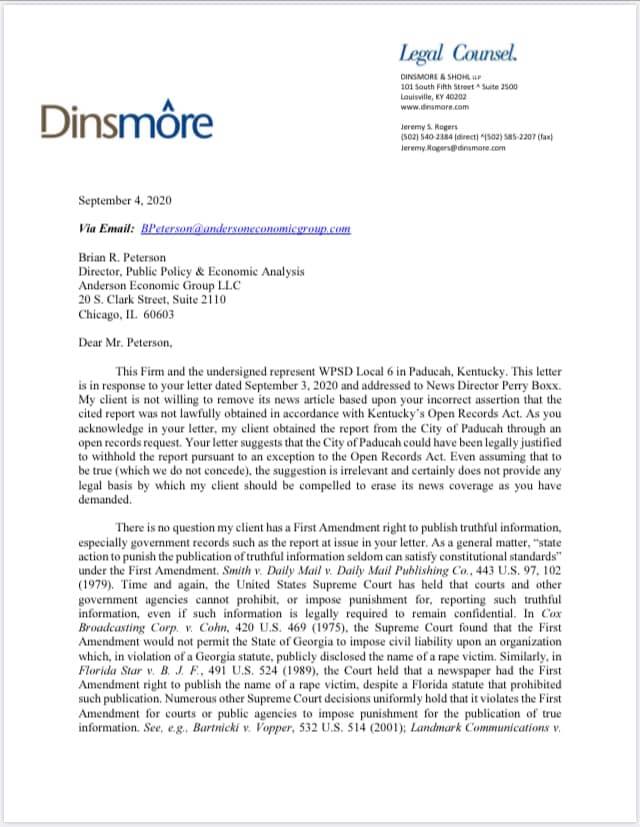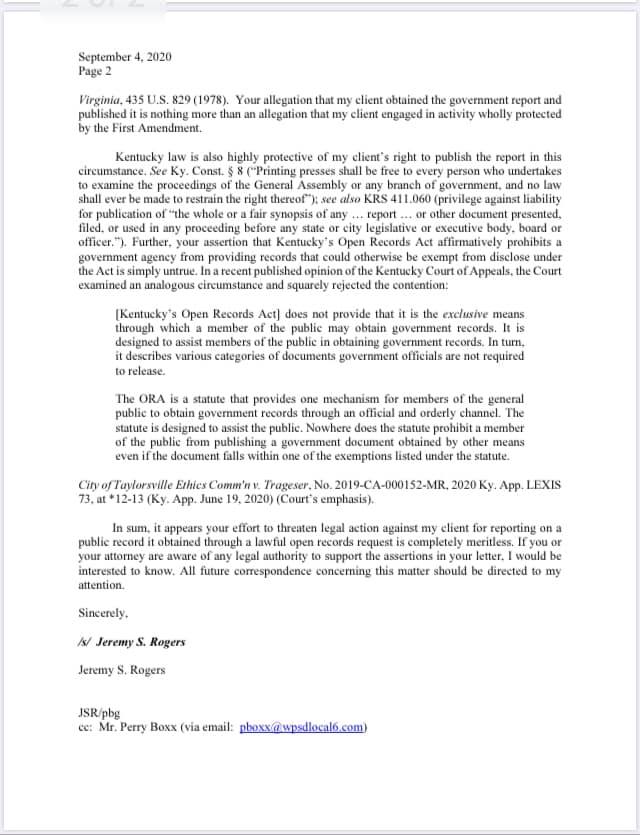


A "cease and desist" demand has been made on WPSD Local 6 News following its publication of a 103 page report prepared by Anderson Economic Group *and obtained by WPSD from the City of Paducah through an open records request.*
https://www.wpsdlocal6.com/paducah-leaders-negotiating-with-state-as-ti…
In the September 3 letter to WPSD news director Perry Box, Anderson "request[s]that this report and all information used in the news story obtained from the report be removed from your website immediately because the document was not lawfully obtained in accordance with the Commonwealth's Open Records Act."
Citing an exception to the open records law that may or may not have been properly invoked by the city, but in any event was not invoked, Anderson characterizes the report as the "property of the Kentucky Cabinet for Economic Development, not the City of Paducah," and threatens "further legal action against WPSD" if the station does not comply with its cease and desist demand.
WPSD counsel Jeremy Rogers—a partner at Dinsmore & Shohl and Kentucky Open Government Coalition director—moved swiftly to disabuse Anderson of this absurd notion.
By letter dated September 4, Rogers advised "my client is not willing to remove its news article based upon your incorrect assertion that the cited report was not lawfully obtained in accordance with Kentucky's Open Records Act. As you acknowledge in your letter, my client obtained the report from the City of Paducah through an open records request. Your letter suggests that the City of Paducah could have been legally justified to withhold the report pursuant to an exception to the Open Records Act. Even assuming that to be true (which we do not concede), the suggestion is irrelevant and certainly does not provide any legal basis by which my client should be compelled to erase its news coverage as you have demanded."
Referencing his recent Court of Appeals victory in City of Taylorsville Ethics Comm'n v. Trageser, Rogers continued, "The assertion that Kentucky's Open Records Act affirmatively prohibits a government agency from providing records that could otherwise be exempt from disclosure under the Act is simply untrue. In a recent published opinion of the Kentucky Court of Appeals, the Court examined an analogous circumstance and squarely rejected the contention:
'[Kentucky's Open Records Act] does not provide that it is the exclusive means through which a member of the public may obtain government records. It is designed to assist members of the public in obtaining government records. In turn, it describes various categories of documents government officials are not required to release.
'The ORA is a statute that provides one mechanism for members of the general public to obtain government records through an official and orderly channel. The statute is designed to assist the public. Nowhere does the statute prohibit a member of the public from publishing a government document obtained by other means even if the document falls within one of the exemptions listed under the statute.'"
"In sum," Rogers concluded, "it appears your effort to threaten legal action against my client for reporting on a public record it obtained through a lawful open records request is completely meritless."
The Coalition vigorously objects to Anderson's attempt—and any other attempt—to "unring the bell" once rung through publication of public records lawfully obtained under the state's open records law—or for that matter, as Rogers points out, "by other means."
We remind Anderson that a public record may have multiple agency records custodians, regardless of origin or authorship, if it is "prepared, owned, used, in the possession of *or* retained by a public agency."
https://apps.legislature.ky.gov/law/statutes/statute.aspx?id=45231
The Anderson Economic Group report is a record of *both* the Cabinet for Economic Development *and* the City of Paducah. An open records request to either agency triggers that agency's statutory obligations under the open records law.
The agency may honor the request and release the requested record; deny the request based on a statutory exception,; *or* exercise its discretion to waive any arguably applicable exception and release the requested record.
Further, we remind Anderson that the exceptions to the open records law—including the exception cited in its cease and desist letter to WPSD—are permissive and not mandatory. They are "a shield and not a shackle." Thus, Kentucky's Supreme Court has declared, "the General Assembly did not intend to mandate an iron rule of non-disclosure whenever an exemption applies."
https://caselaw.findlaw.com/ky-supreme-court/1653243.html
Consistent with the legislative policy that "free and open examination of public records is in the public interest," public agencies may freely waive the exceptions.
https://apps.legislature.ky.gov/law/statutes/statute.aspx?id=23058
And finally, we remind Anderson that its disturbing misinterpretation of the open records law, and threatened legal action, run counter to this legislative statement of policy that has been embedded in the law—in one form or another—since its enactment in 1976.
Perhaps it it Anderson—and not WPSD—that should cease and desist.


